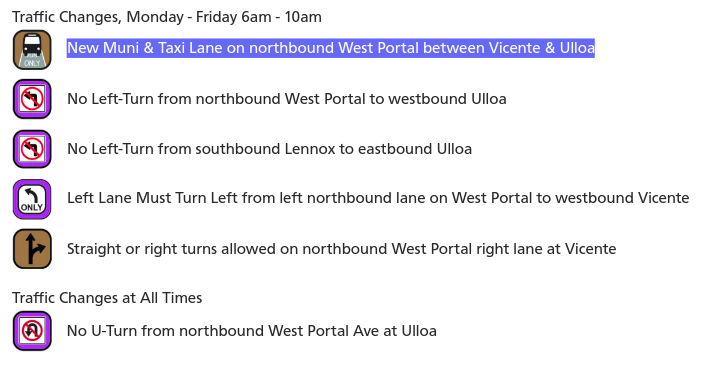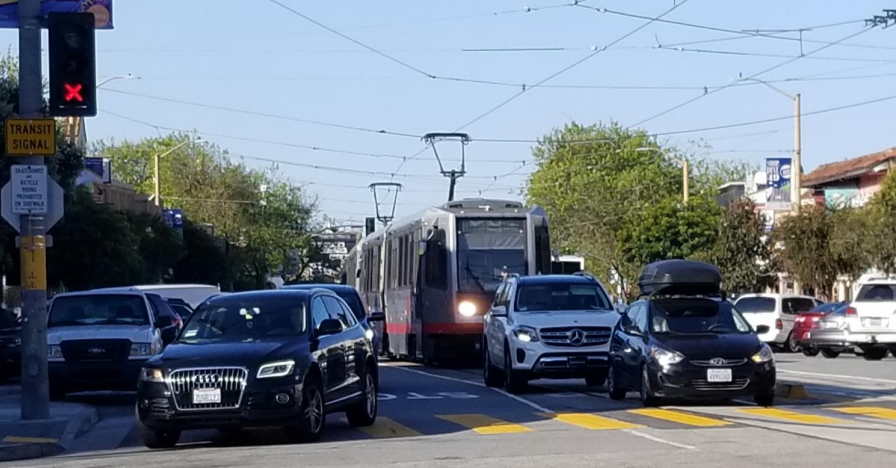Note: GJEL Accident Attorneys regularly sponsors coverage on Streetsblog San Francisco and Streetsblog California. Unless noted in the story, GJEL Accident Attorneys is not consulted for the content or editorial direction of the sponsored content.
The SFMTA is planning to pilot a short stretch of transit- (and taxi) only lane in West Portal to help reduce delays to trains, in one direction, only during peaking morning rush hour. The idea is to look for ways to make the K and M lines, which are consistently slowed by automobile traffic, faster and more reliable.
From the SFMTA presentation showing the proposed changes:

However, Supervisor Norman Yee, who represents the district, is attempting to block the pilot.
Streetsblog was leaked a printout of an email from Yee to SFMTA Director Ed Reiskin and the SFMTA Board. In it, Yee creates a Catch-22. SFMTA is doing the pilot to see if getting cars out of the way will make Muni trains faster and less prone to delays. But Yee seems to want them to prove that it will reduce delays before they do the pilot, to justify doing the pilot to see if it will reduce delays.
From Yee's email:
If you cannot show that the most significant cause of transit delay is street traffic or pedestrian movement, why should the City and SFMTA spend its resources on "fixes" that do not address the actual cause? Why should the community be impacted negatively by proposed changes if these changes do not address the actual cause?
First of all, how does he even know the community will be impacted negatively by a pilot that hasn't happened yet? The San Francisco Transit Riders' Rachel Hyden put it well in a letter to the Supervisor:
It’s difficult to understand your rationale for opposing this important transit reliability and pedestrian safety project, given that you are President of the Board of Supervisors in a city with a transit-first policy. As a Director on the Transportation Authority, you are charged with upholding a mission to make travel safer, healthier, and easier for all.
Hyden adds that:
Further, you have a strong record as a Vision Zero advocate - a program that works to reduce dangerous private vehicle movements, like those happening at West Portal. You have recently introduced a resolution to speed up safety improvements across the city.
Yee's email to the SFMTA also quotes a merchant who claims that: "The only thing holding up the Muni and Metro at that corner is the buses and trains themselves."
That's obviously not true. While there are many factors that cause Muni delays--and many of them clearly do come down to Muni itself--getting blocked by private cars is indisputably a factor. Keep in mind that West Portal Avenue has angled parking spots up and down the street and a lane of traffic in each direction, in addition to the lanes with the tracks. So most of the street would remain dedicated to motorists even during the pilot. The SFMTA study is simply to look at what would happen if transit riders--who represent the vast majority of the users of the street--were given just the center lanes.
Also from Hyden's letter:
To suggest any effort by the SFMTA to improve transit operations at West Portal isn't necessary is difficult to digest. There are 80,000 riders traveling through West Portal every day. As a neighbor whose only mode of transportation is Muni, I am at West Portal with the rest of the commuters as we are routinely stranded, kicked off the train, and nearly hit by private vehicles at West Portal. We are desperate for anything the MTA can do to make it better.
Hyden is writing to the same Norman Yee, by the way, who co-sponsored a San Francisco resolution calling climate change an "emergency."
SFMTA should do the pilot; if anything the transit-only lanes should extend in both directions for the length of the street, not just for a few blocks. And if it shaves even one minute off for the 80,000 people who use transit, they should make the tracks through West Portal and the rest of the run, all the way to Balboa Park, into transit-only lanes with concrete barriers to eliminate intrusions by automobiles, including taxis. There are plenty of traffic lanes in the city available to motorists that aren't essential to the entire transit system. Parochial interests aside, when it comes to transit versus private cars, the voters of San Francisco have made their wishes on this issue crystal clear.
Tell the SFMTA board how you feel tomorrow, Tuesday, May 21, 1 p.m., Room 400, Floor 4, 1 Dr. Carlton B. Goodlett Place, S.F. Or email them if you can't make it MTABoard [at] SFMTA.com.





